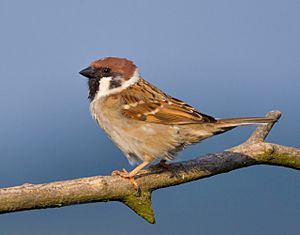Four pests campaign facts for kids
The Four Pests Campaign (Chinese: 除四害; pinyin: Chú Sì Hài) was a big plan in China that started in 1958. It aimed to get rid of four specific creatures. These were rats, flies, mosquitoes, and sparrows.
This campaign was part of an even bigger plan called the Great Leap Forward. The Great Leap Forward wanted to quickly improve China's economy in the mid-20th century.
The part of the campaign that focused on sparrows was also known as the Smash Sparrows Campaign (Chinese: 打麻雀运动; pinyin: Dǎ Máquè Yùndòng) or Eliminate Sparrows Campaign (Chinese: 消灭麻雀运动; pinyin: Xiāomiè Máquè Yùndòng).
Why Target Sparrows?
The government believed that sparrows ate too much grain. They thought getting rid of sparrows would help farmers grow more food. So, people were encouraged to scare sparrows away from farms and even kill them.
Unexpected Problems
Getting rid of so many sparrows caused a big problem for nature. Sparrows don't just eat grain; they also eat many harmful insects. With fewer sparrows, the number of insects grew very fast. These insects then ate even more crops than the sparrows ever did.
This led to a serious ecological imbalance. It was one of the reasons for a time when many people in China didn't have enough food. This period is known as the Great Chinese Famine.
Changes to the Campaign
In 1960, the leader of China, Mao Zedong, realized the problems caused by killing sparrows. He decided to stop the campaign against sparrows. Instead, the fourth "pest" was changed to bed bugs.
Years later, after Mao Zedong passed away in 1976, the official news agency in China announced something important. They said that sparrows were actually more helpful than harmful. After this, the government even took steps to help the sparrow population grow again in places like Shandong province.
Images for kids
See also
 In Spanish: Exterminio de gorriones en China para niños
In Spanish: Exterminio de gorriones en China para niños
 | Audre Lorde |
 | John Berry Meachum |
 | Ferdinand Lee Barnett |



